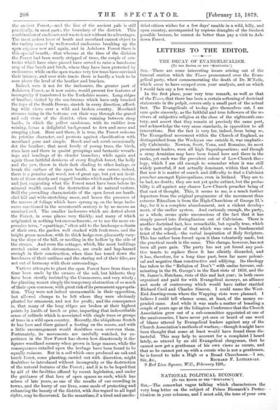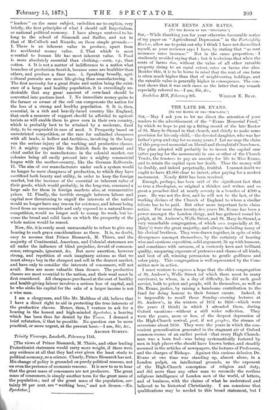NATIONAL POLITICAL ECONOMY.
[TO THE EDITOR OF THE .` SPECTATOR."}
Sin,—The somewhat vague talking which characterises the very long letter on the subject of Prince Bismarck's Protec- tionism in your columns, and I must add, the tone of your own
" leaders " on the same subject, embolden me to explain, very briefly, the first principles of what I should call Imperialism, or national political economy. I have always ventured to be- long to the school of Sismondi and Sadler, and not to that of McCulloch and Ricardo, on these simple grounds :- 1. There is an inherent value in produce, apart from its accidental money value. 2. That which is most essential to human life has most inherent value. 3. Food is more absolutely essential than clothing,—corn, e.g., than cotton. 4. It is not a matter of indifference to a nation what branches of production flourish, because some are healthier than others, and produce a finer race. 5. Speaking broadly, agri- cultural pursuits are more life-giving than manufacturing. 6. The first necessity for a great State and nation being the exist- ence of a large and healthy population, it is exceedingly un- desirable that any great amount of corn-land should be converted into pasture-land. 7. No immediate money-gains to the farmer or owner of the soil can compensate the nation for the loss of a strong and healthy population. 8. It is, then, essential, in a rich and heavily-taxed country like England, that such a measure of support should be afforded to agricul- turists as will enable them to grow corn in their own country, -which is probably best to be attained by a moderate, fixed duty, to be suspended in case of need. 9. Prosperity based on unrestricted competition, or the race for unlimited cheapness with all lands, is hollow and factitious, involving in the long- run the serious injury of the working and productive classes.
10. A mighty empire like the British finds its natural and chief outlet for its manufactures in the colonial market, our -colonies being all easily pressed into a mighty commercial league with the mother-country, like the German Zollverein.
11. The aim of our manufacturers under such a system would no longer be mere cheapness of production, to which they have sacrificed both beauty and utility, in order to keep the foreign market, but the increase of the essential or inherent value of their goods, which would probably, in the long-run, command a large sale for them in foreign markets also, at remunerative prices. 12. Finally, the terrible struggle between labour and eapital now threatening to engulf the interests of the nation would no longer have any reason for existence, and labour being freed from an unreasonable and only exposed to a natural home 'competition, would no longer seek to scamp its work, but be- .come the broad and solid basis on which the prosperity of the whole nation would-be reared.
Now, Sir, it is surely most unreasonable to refuse to give any hearing to such grave considerations as these. It is, no doubt,
• easy to assume that Prince Bismarck, M. Thiers, and the majority of Continental, American, and Colonial statesmen are all under the influence of blind prejudice, devoid of common- sense, retrograde, ignorant, &c. But mere assertion, however strong, and repetition of such imaginary axioms as that we must always buy in the cheapest and sell in the dearest market, and have only to consider the interests of consumers, will not avail. Bees are more valuable than drones. The productive classes are most essential to the nation, and their weal must be first considered. All cheapness purchased at the cost of healthy and health-giving labour involves a serious loss of capital, and he who sinks his capital for the sake of a larger income is not a wise man.
I am a clergyman, and like Mr. Malthus of old, believe that I have a direct right to aid in protecting the true interests of the productive classes. Hence, then, I venture to ask for a hearing in the honest and high-minded Spectator, a hearing which has been thus far denied by the Times. I demand a brief refutation, ii that be possible. No question can be more practical, or more urgent, at the present hour.—I am, Sir, &c., ARCHER GURNEY. Trinity Vicarage, Lambeth, February 11th.
[The views of Prince Bismarck, M. Thies, and other leading Protectionist statesmen would carry more weight, if there were any evidence at all that they had ever given the least study to political economy, as a science. Clearly, Prince Bismarck has not. His change of policy is grounded on purely political reasons, not on even the pretence of economic reasons. It is new to us to hear that the great mass of consumers are not producers. The great mass of consumers, is simply another term for the great mass of the population ; and of the great mass of the population, cer- tainly 99 per cent. are "working bees," and not drones.—En. Spectator.]



































 Previous page
Previous page